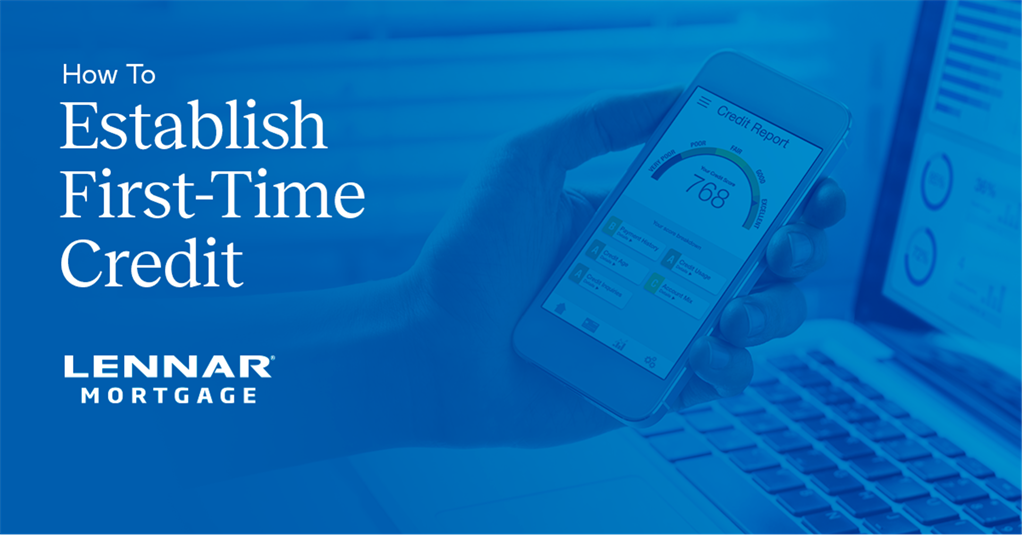How to Establish First-Time Credit

What is a Credit Score?
In short, a credit score is a number that indicates how likely you are to pay back your debts. This number summarizes how you’ve used credit for the past few years, giving lenders a straightforward way to consider you for a loan or line of credit.
There are a few formulas for calculating your credit score, but the one you’ll encounter the most is the FICO score.
Learn more about credit and credit scores.
Why Don’t I Have a Credit Score?
To have a credit score, you’ll need to have used credit in the past. If you don’t have a credit score, it’s likely that you haven’t opened a credit card or taken out a loan in the U.S. in the past 7 years. There are a few reasons that this might be the case:
- You may have been too young (under 18) to take out credit cards or loans in the past.
- You may have recently moved to the United States. (Past financial activities that aren’t tied to your U.S. Social Security Number or ITIN won’t be reported on your credit score.)
- You may have paid off all your loans and not used credit cards for the past 7 years.
Without any credit for lenders to check, it’s more likely that you’ll be denied for accounts that would build your credit. Luckily, there are a few options to start building your credit that don’t require you to have an existing credit score.
3 Tips to Build Your FICO Score from Scratch
Tip 1: Apply for a Credit Card
When you open a credit card, you’ll build a positive credit history with each payment. When getting a credit card, it’s ideal to pay off the full balance of your card each month, avoiding interest that can build up over time.
While most credit cards do require a credit check, there are some options intended for those without a credit score.
- Credit unions sometimes offer credit-building credit cards as a way for their customers to build and improve their credit. While these are a great way to build your credit, they may have steeper usage fees and interest.
- Ask your bank or credit union about student credit card options. These programs are intended for a younger audience and will usually accept you with little to no credit history. There may be college enrollment requirements for these programs.
- A secured credit card requires a deposit upfront. That deposit will determine your spending limit so the lender isn’t taking any risk, though you're still building your credit history. You’ll get your deposit back when you close the account.
Tip 2: Take Out a Credit-Builder Loan
Another option for first-time borrowers is a credit-builder loan, usually offered by credit unions.
With a credit-builder loan, you’ll pay the loan value (usually $300 to $1,000) over a period of 6 to 24 months. Unlike most loans, you’ll only receive the loan value at the end, once all your payments have been made.
In this situation, the lender is not taking any risk because there’s no danger of you not paying their money back. Instead, they are essentially returning your money to you after you’ve made a series of payments. This loan helps establish a history of on-time payments that is beneficial to your credit score.
Tip 3: Use Joint Accounts and Co-Signed Loans
Finally, you can start your credit by sharing credit accounts with a trusted friend or family member.
A co-signer is an individual who is responsible for the debt if the original borrower is unable to pay. If you don’t qualify for a credit card or loan normally, you can add a co-signer with good credit to improve your chances of being approved.
You can also open a joint credit card to build your credit while satisfying the lender’s credit score requirements.
In both cases, it’s important to know the other person has a good credit history and to trust them with your credit. Go for a low credit limit on any joint cards and a small loan amount on any co-signed loans. Once these accounts are open, they’ll build payment history for both users.
Credit Education for Lennar Home Buyers
Your credit score influences the options that are available to you, especially during financial milestones like buying a home! If you’re considering a Lennar home, know that Lennar Mortgage will work with you to find the right financing for you.
We're proud to provide credit education through Home Buyer Solutions Group, helping our Customers overcome credit-related challenges to financing their homes. After you fill out our simple pre-qualification form, your Loan Officer will let you know if we recommend you work with one of our HBSG credit specialists.
Get pre-qualified today to get started!